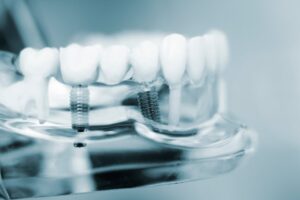Can Dental Implants Rust?
January 10, 2024

One of the best parts about getting dental implants is that they’re able to last so long—25, 30, and even 35 years and beyond. While that sounds great, it’s a long time for metal to be sitting in your mouth and be exposed to all that moisture. Isn’t there a chance that they’ll rust and need to be replaced? Thankfully, while this concern is valid, it’s not really a factor with today’s implants. To learn why and see what actually could jeopardize the longevity of your new teeth, keep reading.
Why Dental Implants Can’t Rust
Whether it’s the car in your garage or your bike growing up, you’ve likely seen plenty of examples of metal objects developing rust. Why would dental implants be any different?
Rust is actually iron oxide, and it’s the result of iron chemically reacting with the air around it. Fortunately, dental implants are not made of iron, but rather titanium.
Titanium, in addition to being incredibly strong, doesn’t react with oxygen the same way as iron. Instead of developing a red crust that easily corrodes, titanium gains a thin, invisible layer of titanium oxide that acts like a protective film. You can’t see it, and it doesn’t flake off like the rust you’re familiar with. In many ways, it actually makes the post more resistant to the environment! The only reason an implant would rust is if it was mixed with iron, but most dentists only use pure titanium ones.
What You Should Really Be Worried About
In truth, the gum and bone tissue that support an implant have a much higher chance of breaking down compared to the implant itself. That’s because while an implanted tooth can’t develop a cavity or infection, the organic tissue still can, causing it to become weak.
However, you already know how to prevent this from happening! You simply have to brush and floss around an implant daily to keep the surrounding tissue healthy and strong, and regular visits to the dentist will allow their team to remove any bacterial buildup that you can’t at home.
All told, whether you already have a dental implant or are currently considering getting one, rust doesn’t need to be on your mind at all.
About the Author
Dr. David M. Weinman is a Fellow of the International Congress of Oral Implantologists, meaning he is an expert when it comes to rebuilding smiles with dental implants and is able to provide the entire procedure in-office. Over the course of his career, he has helped countless patients recover their health and appearance while making sure they remain comfortable each step of the way. To schedule a consultation with Dr. Weinman at his Westfield practice, click here or call (908) 654-7200.
No Comments
No comments yet.
RSS feed for comments on this post.
Sorry, the comment form is closed at this time.
